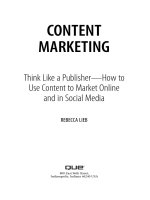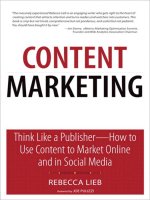Content marketing think like a publisher chapter 14 content marketing for live events
Bạn đang xem bản rút gọn của tài liệu. Xem và tải ngay bản đầy đủ của tài liệu tại đây (737.01 KB, 6 trang )
14
Content Marketing for
Live Events
“Content marketers who are looking for new sources of content can generate
a veritable geyser of invaluable content.”
Content begets content, which is why content marketing
and live events, online or offline, go hand-in-hand. Content
marketing is an excellent way to market events, which,
after all, are about providing content. Content marketers
who are looking for new sources of content can generate a
veritable geyser of invaluable content. This is true of any
event—conferences, seminars, webinars, or trade shows—
that can be leveraged in real time and can be parceled out
in different formats and in varying channels over time.
I have broken down potential activities into three phases:
before, during, and after the event in question. In other
words:
• Content to encourage interest and attendance
• Content that publicizes the goings-on at the event
itself
• Content generated by the event that can be spun off
into other channels.
122
Part III
G e t t i n g Ta c t i c a l : C o n t e n t N u t s & B o l t s
Before: Building Buzz and Interest
Ten or fifteen years ago, email was the de facto way to market an event. Although
email still plays a critical role (particularly if you have a strong and responsive list),
the plethora of content channels available to marketers at little to no cost create
new ways to market content with content. These channels allow you to build buzz
in advance of an event, to harness engagement before opening day, and to provide
tantalizing previews of the coming attractions, from events on the main stage to
highlights of a convention’s trade show floor.
Hashtags—A Critical Underpinning
A foundational part of content event marketing is creating a unique hashtag and
publicizing it from the get-go in all event materials. Hypothetically, this year’s New
York Auto Show hashtag could be, for example, NYAS12.
You want the hashtag to be short and unique, and you want it to be on all digital
content associated with the event. For example:
• As a tag on blog entries.
• As a hashtag on Twitter (with the # sign, of course, so it would be rendered #NYAS12). See Figure 14.1.
• As part of the title or description of all multimedia materials, from
photos to videos to podcasts.
Figure 14.1
Your event hashtag also should be used as a Twitter hashtag.
The purpose of a hashtag is to make any content related to an event (whether you
created it) available and accessible to all comers—and searchers. Event hashtags (of
course, hashtags have many other uses beyond events) organize and aggregate disparate material that’s related to the same thing, such as the New York Auto Show.
Chapter 14
Content Marketing for Live Events
123
The hashtag provides a window onto all the content and media that’s created, discussed, passed along, and uploaded around the event in question. Hashtags make
content organized and accessible, whether pre- or post event.
Social Media Channels
The advantages of having a Facebook event page are numerous. Facebook event
pages provide a way to connect to prospective attendees and to announce updates
to programs and schedules, as well as parties and special events. Facebook’s functionality includes the ability to send public or private invitations to the main event
or to smaller gatherings within the context of a larger conference. When people
respond, invitations that are public are displayed on their own Facebook page,
which in turn helps spread the word among their individual network of contacts.
Besides allowing posting of photos and videos about the event or its speakers or
program updates, Facebook can be used for engagement.
ad:tech, a major conference for digital advertisers, asks questions of its users on
Facebook and polls its audience about whether new conference elements should be
continued (see Figure 14.2).
Figure 14.2
ad:tech uses its Facebook community to help shape its conferences.
It goes without saying that a Twitter account created specifically for your event
serves many of these same purposes, as can a blog. An event YouTube channel is
also very common these days. As shown in Figure 14.3, these can go quite deep,
featuring photos, pre-interviews with speakers (audio, video, or plain old text), and
offers for discount admission, and even attendee testimonials can be leveraged by
all these platforms.
124
Part III
Figure 14.3
G e t t i n g Ta c t i c a l : C o n t e n t N u t s & B o l t s
A YouTube event channel.
During: Building Engagement
Content marketing by no means stops when an event begins. Content can be collected and harnessed to build audience and attendee engagement during an event,
as well as warehoused to roll out post event, to contribute to ongoing content marketing initiatives.
While your event is taking place, you should continue using the same social media
channels that you used to publicize and build buzz for the event. In the tech sector,
it’s common (if not de rigeur) to liveblog sessions. What are the speakers saying
about burning industry issues? Push out videos and photos. Snag people in the
speaker room or in the hallway to capture video interviews that can be published in
near-real time. Collect testimonials from attendees. Blogs can cover nearly every
aspect of a trade show; some bloggers even keep their audience up to date on the
swag and premiums handed out at tradeshow booths. Publish photos of people
schmoozing at parties. (Nothing gets people’s attention more than a photo of them
pushed live to the Web.)
All legitimate forms of content should, of course, be labeled with the event hashtag.
Don’t forget to search for content published under that hashtag. Odds are the audience will be blogging and tweeting the proceedings as well.
Consider building a mobile app that helps attendees navigate the event. An exemplary example is SXSW GO, an app that helps thousands of visitors to Austin,
Texas, get the most out of the massive South By Southwest festival every year (see
Chapter 14
Content Marketing for Live Events
125
Figure 14.4). Some of the app’s features include the ability to build a personal
schedule for the event. Users can search or browse the entire event list or create and
save filters based on category, subcategory, track, and venue.
Figure 14.4
SXSW GO app.
The app also includes a map that displays what’s going on and how to get there. The
tradeshow can be searched or browsed for exhibitors, and there’s a built-in link to
major social media sites such as Facebook, Gowalla, and Twitter, so users can track
all the content being created around the festival by other attendees.
Keeping people in touch with an event as it happens—even people who are unable
to attend—provides a great window on your business’s concerns, style, and personality. This can pay dividends into the future.
After: You’ve Got Content!
Hosting or even attending a professional event can have lots of purposes: marketing
a business, nurturing leads, connecting with clients, and making new connections.
For content marketers, an event is also a rich opportunity to harvest content that
can be pushed out through a variety of channels and presented in a multitude of
ways.
Those who are constantly on the hunt for new ideas for content can find goldmines
at events, conferences, and tradeshows.
126
Part III
G e t t i n g Ta c t i c a l : C o n t e n t N u t s & B o l t s
Bearing in mind the cardinal rule to always, always use hashtags, an obvious way to
feature event content is to make presentations publicly accessible on Slideshare (see
Figure 14.5). This free site hosts PowerPoint and other presentations online or via
download. Obviously, aside from announcing that presentations will be available on
Slideshare after an event, blogs and other social media links discussing presentation
content can link to the original presentation.
Figure 14.5 Make your presentations publicly available on Slideshare.
Post-event is also the time to assess content that was created, generated, and harvested at the event. It’s also the time to develop an editorial calendar to roll it out in
different channels and in different formats over time. Do you have a video interview with an industry luminary? By all means,
post it on YouTube, and link to the video from a
blog or Facebook page. Also consider transcribing
the spoken word, which creates extra SEO value;
search engines can only “read” text, not video.
Then use that written-word format for a blog
entry, an eBook chapter, or a newsletter article.
Although some content generated by a live event
will be hot-off-the-presses newsworthy, other elements will range from topical to evergreen. Parcel it
out accordingly. Events are a rich source of content
that in the future will be graded on success metrics.
Those metrics will take into account leads generated or deals closed, as well as the quality and
quantity of content generated for ongoing marketing initiatives.
“Those who
are constantly
on the hunt for
new ideas for
content can
find goldmines
at events, conferences, and
tradeshows.”









